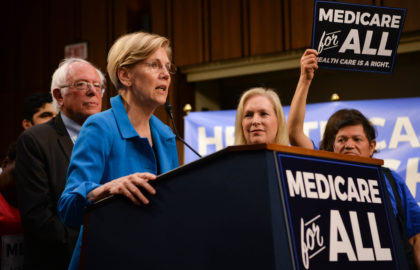This week, the revitalization of a Republican effort to repeal and replace Obamacare gained steam behind the Graham-Cassidy proposal. The bill would block grant portions of federal health spending to the states while eliminating the individual mandate and the medical device tax. Only a week after many Democrats revealed their vision for a single-payer system as the next step beyond Obamacare, they are now scrambling to fend off the renewed Republican effort many declared dead.
The Congressional Budget Office (CBO) score, which Democrats effectively used previously by magnifying the loss of projected coverage, will again be used as a tactic to garner up public opposition to the Graham-Cassidy proposal. Democratic leaders wrote a letter asking for the CBO to score the Graham-Cassidy proposal so that the American people can know the “full consequences of Graham-Cassidy before any vote.”
While Democrats will push the CBO score of Republican health care proposals as undeniable facts, they continually ignore the full consequences of what CBO says year in and year out – that our current policies have our nation on an unsustainable fiscal path that hurts growth, squeezes budgets for future generations, and could lead to a fiscal crisis. Here are excerpts from CBO’s 2017 Long Term Debt Outlook released in March.
“At 77 percent of gross domestic product (GDP), federal debt held by the public is now at its highest level since shortly after World War II. If current laws generally remained unchanged, the Congressional Budget Office projects, growing budget deficits would boost that debt sharply over the next 30 years; it would reach 150 percent of GDP in 2047. The prospect of such large and growing debt poses substantial risks for the nation and presents policymakers with significant challenges.”
 “Large and growing federal debt over the coming decades would hurt the economy and constrain future budget policy. The amount of debt that is projected under the extended baseline would reduce national saving and income in the long term; increase the government’s interest costs, putting more pressure on the rest of the budget; limit lawmakers’ ability to respond to unforeseen events; and increase the likelihood of a fiscal crisis, an occurrence in which investors become unwilling to finance a government’s borrowing unless they are compensated with very high interest rates.”
“Large and growing federal debt over the coming decades would hurt the economy and constrain future budget policy. The amount of debt that is projected under the extended baseline would reduce national saving and income in the long term; increase the government’s interest costs, putting more pressure on the rest of the budget; limit lawmakers’ ability to respond to unforeseen events; and increase the likelihood of a fiscal crisis, an occurrence in which investors become unwilling to finance a government’s borrowing unless they are compensated with very high interest rates.”
As we have written before, federal healthcare programs and aging demographics have a substantial impact on CBO’s debt outlook. If Democrats want to embrace CBO scores as the end-all-be-all for sound public policy making, then they should also embrace the rest of CBO’s work – including their warnings that current Congressional policies are bankrupting our country. Otherwise, they are just being political opportunists, using CBO as a convenient political tool while banishing future generations to reduced standards of living.


